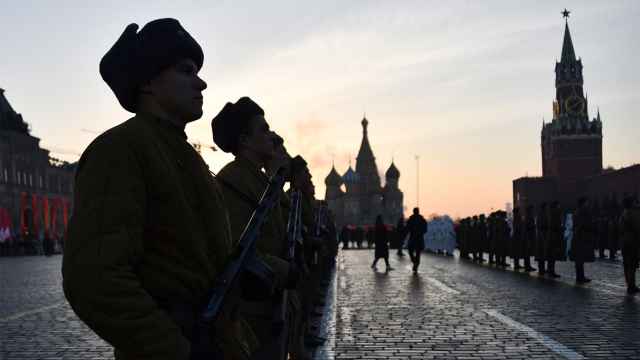A new law aimed at tackling hooliganism at sporting events in Russia contains a number of bizarre stipulations, one of which requires fans to provide notarized translations for banners carrying foreign messages.
Russian football has been marred by a number of over the last year and a half and the so-called law on fans, which came into effect this week, was drawn up largely to prevent the reoccurrence of such incidents.
Flares and provocative banners have been outlawed at events, while stewards will be hired to help police supervise spectators.
A blacklist of fans who are prohibited from attending sporting events for up to seven years will be created, and fines of 15,000 rubles ($442) will be given to offenders who flout the ban.
Fans are also forbidden from covering their faces with masks, according to the law, which appeared on the government's website last month.
But while the law contains a lot of unquestionably reasonable regulations for fans' behavior, it also sets out provisions that supporters could take exception to, such as requiring notarized translations of foreign language banners.
It is unclear whether languages native to certain Russian republics, such as Chechen or Udmurt, will be considered "foreign." If they are, then fans of Chechen football club Terek Grozny, for example, would have to find a notary ahead of matches if they want to display banners with messages written in their native language, blogger Vladimir Varfolomeyev wrote on his LiveJournal blog.
It could also affect supporters of foreign sporting organizations whose teams are competing in Russia, not to mention visitors to the 2014 Winter Olympics in Sochi who want to support their countrymen and women with cleverly written slogans.
Security staff at sporting events will also have to be equipped with measuring tapes, now that stringent size restrictions on flags and banners have also been adopted.
Various wind instruments like the vuvuzela, a plastic horn that drove visiting fans to despair at the 2010 FIFA World Cup, have been banned, though horns and flutes are acceptable. Restrictions on drums and megaphones are also included.
Furthermore, the law now guarantees spectators the right to free access to toilets at Russia's venues.
Alexander Shprygin, president of the All-Russia Fans Organization, said he was satisfied that some of the more extreme regulations proposed by "hot head" lawmakers, such as requiring supporters to display their passports when buying tickets for football matches, were not implemented.
However, he said he was concerned that the punishments for many indiscretions are not set in stone and will be left to the discretion of judges, Gazeta.ru reported Monday.
"In terms of traffic law, if you are not wearing a seatbelt, it's one punishment, and if you are drunk behind the wheel, then it's another. Here, everything is up to the judge, whether you shout obscenities or you run onto the pitch and interrupt the match."
Members of various football supporters associations have criticized the law for being too harsh, but the president of the Russian Football Premier League, Sergei Pryadkin, thinks that it is wrong to call the measures repressive, Rossiiskaya Gazeta reported Monday.
"This law is directed against those who don't come to support football, but to take out some sort of revenge or prove something to someone," Pryadkin said.





